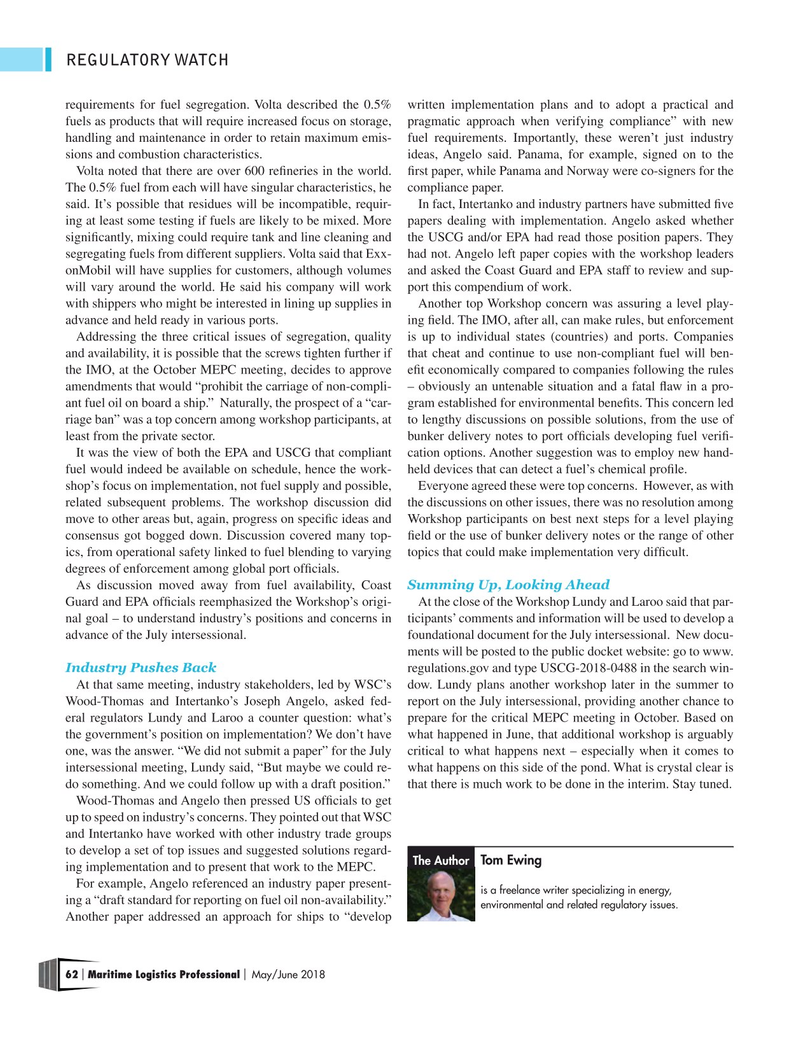
Page 62: of Maritime Logistics Professional Magazine (May/Jun 2018)
Container Ports
Read this page in Pdf, Flash or Html5 edition of May/Jun 2018 Maritime Logistics Professional Magazine
REGULATORY WATCH requirements for fuel segregation. Volta described the 0.5% written implementation plans and to adopt a practical and fuels as products that will require increased focus on storage, pragmatic approach when verifying compliance” with new handling and maintenance in order to retain maximum emis- fuel requirements. Importantly, these weren’t just industry sions and combustion characteristics. ideas, Angelo said. Panama, for example, signed on to the
Volta noted that there are over 600 refneries in the world. frst paper, while Panama and Norway were co-signers for the
The 0.5% fuel from each will have singular characteristics, he compliance paper.
said. It’s possible that residues will be incompatible, requir- In fact, Intertanko and industry partners have submitted fve ing at least some testing if fuels are likely to be mixed. More papers dealing with implementation. Angelo asked whether signifcantly, mixing could require tank and line cleaning and the USCG and/or EPA had read those position papers. They segregating fuels from different suppliers. Volta said that Exx- had not. Angelo left paper copies with the workshop leaders onMobil will have supplies for customers, although volumes and asked the Coast Guard and EPA staff to review and sup- will vary around the world. He said his company will work port this compendium of work.
with shippers who might be interested in lining up supplies in Another top Workshop concern was assuring a level play- advance and held ready in various ports. ing feld. The IMO, after all, can make rules, but enforcement
Addressing the three critical issues of segregation, quality is up to individual states (countries) and ports. Companies and availability, it is possible that the screws tighten further if that cheat and continue to use non-compliant fuel will ben- the IMO, at the October MEPC meeting, decides to approve eft economically compared to companies following the rules amendments that would “prohibit the carriage of non-compli- – obviously an untenable situation and a fatal faw in a pro- ant fuel oil on board a ship.” Naturally, the prospect of a “car- gram established for environmental benefts. This concern led riage ban” was a top concern among workshop participants, at to lengthy discussions on possible solutions, from the use of least from the private sector. bunker delivery notes to port offcials developing fuel verif-
It was the view of both the EPA and USCG that compliant cation options. Another suggestion was to employ new hand- fuel would indeed be available on schedule, hence the work- held devices that can detect a fuel’s chemical profle.
shop’s focus on implementation, not fuel supply and possible, Everyone agreed these were top concerns. However, as with related subsequent problems. The workshop discussion did the discussions on other issues, there was no resolution among move to other areas but, again, progress on specifc ideas and Workshop participants on best next steps for a level playing consensus got bogged down. Discussion covered many top- feld or the use of bunker delivery notes or the range of other ics, from operational safety linked to fuel blending to varying topics that could make implementation very diffcult.
degrees of enforcement among global port offcials.
As discussion moved away from fuel availability, Coast Summing Up, Looking Ahead
Guard and EPA offcials reemphasized the Workshop’s origi- At the close of the Workshop Lundy and Laroo said that par- nal goal – to understand industry’s positions and concerns in ticipants’ comments and information will be used to develop a advance of the July intersessional. foundational document for the July intersessional. New docu- ments will be posted to the public docket website: go to www.
Industry Pushes Back regulations.gov and type USCG-2018-0488 in the search win-
At that same meeting, industry stakeholders, led by WSC’s dow. Lundy plans another workshop later in the summer to
Wood-Thomas and Intertanko’s Joseph Angelo, asked fed- report on the July intersessional, providing another chance to eral regulators Lundy and Laroo a counter question: what’s prepare for the critical MEPC meeting in October. Based on the government’s position on implementation? We don’t have what happened in June, that additional workshop is arguably one, was the answer. “We did not submit a paper” for the July critical to what happens next – especially when it comes to intersessional meeting, Lundy said, “But maybe we could re- what happens on this side of the pond. What is crystal clear is do something. And we could follow up with a draft position.” that there is much work to be done in the interim. Stay tuned.
Wood-Thomas and Angelo then pressed US offcials to get up to speed on industry’s concerns. They pointed out that WSC and Intertanko have worked with other industry trade groups to develop a set of top issues and suggested solutions regard-
Tom Ewing
The Author ing implementation and to present that work to the MEPC.
For example, Angelo referenced an industry paper present- is a freelance writer specializing in energy, ing a “draft standard for reporting on fuel oil non-availability.” environmental and related regulatory issues.
Another paper addressed an approach for ships to “develop 62 Maritime Logistics Professional May/June 2018 | |

 61
61

 63
63
